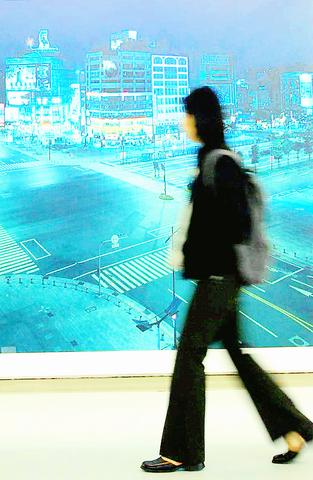If the Taipei Biennial ever had a political goal, it was the amicable diplomacy of art.
But this year the brand of cross-strait bickering usually reserved for government officials has intruded on an exhibition that since 1998 has put the Taipei Fine Arts Museum on contemporary art's international map.
The 2002 Taipei Biennial, curated by Bartomeu Mari of Spain and Taiwan's Jason Wang (

PHOTO: SEAN CHAO, TAIPEI TIMES
The opening, held last night, attracted critics and curators from Lyons to Beijing, who had all come to see an exhibition conscientiously designed around artifice, spectacle and the spaces in which people live and act. Its theme is "Great Theater of the World."
The behind-the-scenes intrigue comes from the dark world of politics.
The drama began in March at Brazil's Sao Paulo Biennial, where the Chinese government put pressure on organizers to remove the word "Taiwan" from Taiwan's national pavilion, making it the only one of around 70 national pavilions not designated by a country. The pavilion's entrance merely read "Taipei Fine Arts Museum."
In response, Taiwan's representative artist, Chang Chien-chi (
Chang, a photographer devoted to social issues that are more or less borderless, is not part of this year's biennial, but Wang Gong-hsin (
Word of Wang's presence broke yesterday in a Chinese-language newspaper, which raised the question of his involvement in the Sao Paulo incident.
Museum officials, Wang and the art world in general, denounced the allegation as ridiculous.
Wang, in fact, called the article "amusing," but refused to enter into any debate, saying that as an artist it was more suitable to remain in the province of art.
Taiwanese sources also defended Wang.
The co-curator of the 2000 Taipei Biennial, Manray Hsu (許文瑞), who was also in Sao Paulo, said of the censorship incident, "It had more to do with the [Chinese] government. They were the source of the pressure."
Museum director Huang Tsai-lang (
Even the beleaguered Chang said, "There's no proof of Wang's involvement."
Though the buzz of controversy was still building at last night's opening ceremony, but visiting artists were not impressed.
"The reason we have these exhibitions is to move away from these stupid boundaries and limitations," said Edwin Zwakman, an artist from the Netherlands.
"This is not a propaganda game for governments," he said.
For more information on the art work in the 2002 Biennial, see tomorrow's features page.

The Grand Hotel Taipei on Saturday confirmed that its information system had been illegally accessed and expressed its deepest apologies for the concern it has caused its customers, adding that the issue is being investigated by the Ministry of Justice Investigation Bureau. The hotel said that on Tuesday last week, it had discovered an external illegal intrusion into its information system. An initial digital forensic investigation confirmed that parts of the system had been accessed, it said, adding that the possibility that some customer data were stolen and leaked could not be ruled out. The actual scope and content of the affected data

‘LIKE-MINDED PARTNER’: Tako van Popta said it would be inappropriate to delay signing the deal with Taiwan because of China, adding he would promote the issue Canadian senators have stressed Taiwan’s importance for international trade and expressed enthusiasm for ensuring the Taiwan-Canada trade cooperation framework agreement is implemented this year. Representative to Canada Harry Tseng (曾厚仁) in an interview with the Central News Agency (CNA) said he was increasingly uneasy about Ottawa’s delays in signing the agreement, especially as Ottawa has warmed toward Beijing. There are “no negotiations left. Not only [is it] initialed, we have three versions of the text ready: English, French and Mandarin,” Tseng said. “That tells you how close we are to the final signature.” Tseng said that he hoped Canadian Prime Minister Mark Carney

POSITIVE DEVELOPMENT: Japan and the US are expected to hold in-depth discussions on Taiwan-related issues during the meeting next month, Japanese sources said The holding of a Japan-US leaders’ meeting ahead of US President Donald Trump’s visit to China is positive news for Taiwan, former Japan-Taiwan Exchange Association representative Hiroyasu Izumi said yesterday. After the Liberal Democratic Party’s landslide victory in Japan’s House of Representatives election, Japanese Prime Minister Sanae Takaichi is scheduled to visit the US next month, where she is to meet with Trump ahead of the US president’s planned visit to China from March 31 to April 2 for a meeting with Chinese President Xi Jinping (習近平). Japan and the US are expected to hold in-depth discussions on Taiwan-related issues during the

President William Lai (賴清德) yesterday bestowed one of Taiwan’s highest honors on Saint Vincent and the Grenadines (SVG) Ambassador Andrea Clare Bowman in recognition of her contributions to bilateral ties. “By conferring the Order of Brilliant Star with Grand Cordon on Ambassador Bowman today, I want to sincerely thank her, on behalf of the Taiwanese people, for her outstanding contribution to deepening diplomatic ties between Taiwan and SVG,” Lai said at a ceremony held at the Presidential Office in Taipei. He noted that Bowman became SVG’s first ambassador to Taiwan in 2019 and